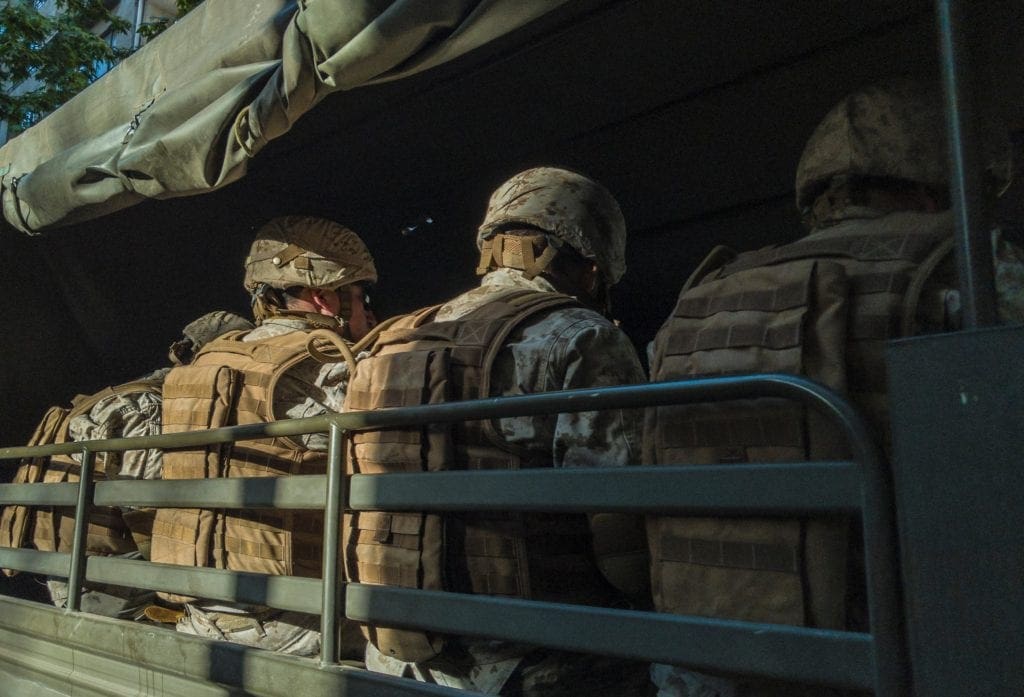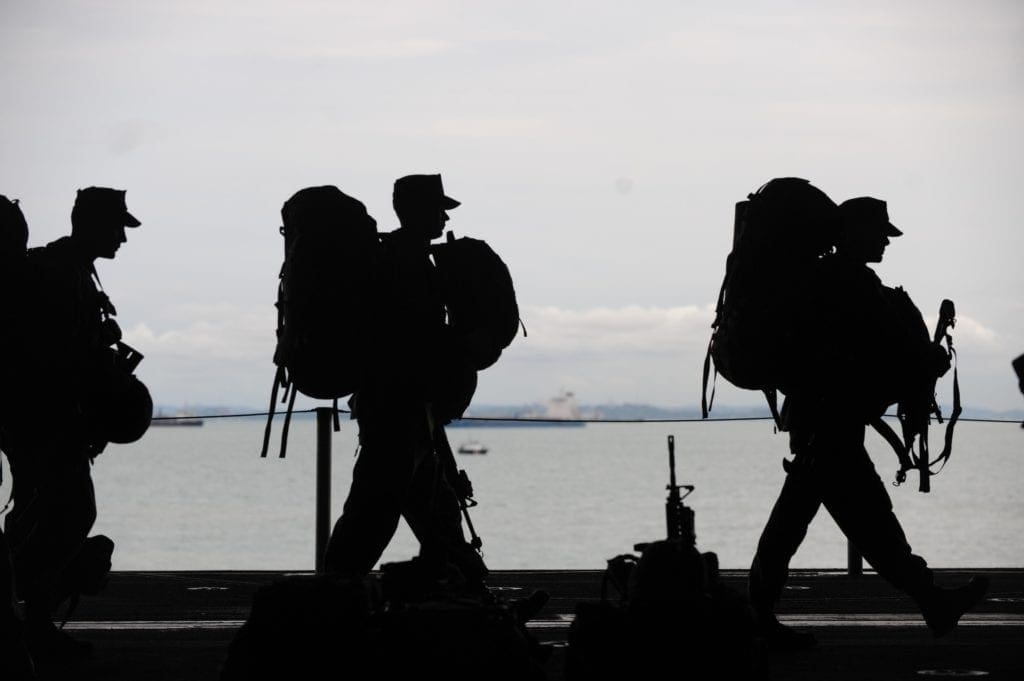How do You Defeat Hydra?
This article was featured in our weekly newsletter, the Liberator Online. To receive it in your inbox, sign up here.
Me: YS, do you know what a Hydra is?
BA (10): It’s a monster. Every time you chop off one of its heads, two grow in its place.
Me: How do you know this?
 BA:
BA: Minecraft. In the Twilight Forest there’s a Hydra.
Me: Do you know why I’m asking about the Hydra?
YS (15): Terrorism? It’s like we’re fighting Hydra. The more we fight, the more heads it makes.
Me: So how do you defeat an enemy like that?
YS: First you need to stop cutting off the heads.
Me: But that doesn’t make it go away. How do you destroy a thing you can’t destroy with an attack?
YS: Stop fueling it.
Me: What is this Hydra’s fuel?
YS: We’ve been giving this Hydra literal weapons, literal training, literal financing.
Me: Why did we do this?
YS: We thought we could control it so we grew it. Then it spun out of control. Now it’s attacking us.
Me: Who are the teeth of the Hydra?
YS: Terrorists who carry out the attacks.
Me: And what can you tell me about them?
YS: They’re mad. They’ve had something done to them.
Me: They are called Injustice Collectors and they are easily radicalized. You’re describing something called radicalization. Sometimes what happens is citizens of a country will become radicalized and carry out acts of terror in their own country. People are afraid of immigrants and refugees when actually it’s just as likely to be radicalized citizens who carry out terrorism in their own countries. If someone is running away from terrorism in their own country are they going to become radicalized in their new home?
YS: No. They want nothing to do with it. Refugees from ISIS are the anti-ISIS. They have experienced it.
Me: What kind of effect will an influx of refugees fleeing ISIS violence have on a population?
YS: Those people are not likely to be recruited. They’re going to tell people who could potentially be radicalized that they shouldn’t. They’ve lived it.
Me: What else feeds the Hydra?
YS: Hatred.
Me: When you are hateful to a person they are more willing to be the teeth. How do we make them unwilling to be the teeth?
YS: Those people around us that ISIS is targeting for recruitment, we need to show them kindness.
Me: That’s what starves Hydra.
YS: The state has murdered their people in our name, just like ISIS has murdered people in the name of all Muslims. We have to be kind and think logically. We have to not want to be afraid of these terrorists. Emotional responses don’t get people anywhere.
Me: We kind of enjoy being afraid, don’t we?
YS: Right. Like gun control. Emotional, irrational responses. There’s a mass shooting and people get scared and the start yelling for gun control. It’s like that. It doesn’t work. Gun control doesn’t stop violent people. It just makes it easier for violent people to be violent. It’s an emotional response. We need to think but emotional responses are a lot of fun for the majority of people.
 After 17 years, more than $1 trillion spent, thousands of American casualties — not to mention the over 200,000 Iraqi civilian victims — the U.S. has no clear vision for what it wants to do in Iraq. In the meantime, American soldiers get caught in the crossfire, our debt continues to pile up, and the Middle East spirals out of control, as it historically has.
This is only the tip of the iceberg, however. Tension is growing in Iraq itself. Iraqis have grown restless over the continued American presence in their country. The pressure was so high that the Iraqi parliament unanimously voted to have Americans leave the country. Led by nationalist Shiite cleric Muqtada Al-Sadr, the protesters want both American and Iranian actors out of their country.
The American government’s killing of Major General Qassem Soleimani sparked the unanimous vote by the Iraqi Parliament to scrap its agreement with the U.S. military to maintain American troops in the country. One would think that the U.S. leadership would get the memo after the resounding vote. However, when Iraqi Prime Minister Adil Abdul-Mahdi floated the issue with Secretary of State Mike Pompeo, the idea was instantly scrapped.
U.S. political elites still think a military presence is a “force for good” in the Middle East to fight terrorist groups such as ISIS. However, countless Iraqis disagree with this. On January 24, 2020, nearly a million Iraqis protested the American government’s military occupation of the country. The protesters demanded the closure of all U.S. military bases and that a timetable is established for pulling out all U.S. military forces.
Paul posed some interesting questions for nation-building zealots to consider.
“How many billions of dollars have we sent to Iraq to help them build their democracy? Yet as soon as a decision of Iraq’s elected parliament goes against Washington’s wishes, the US government is no longer so interested in democracy. Do they think the Iraqis don’t notice this double-dealing?” Paul asked.
Washington D.C. is becoming increasingly misinformed about what’s taking place in Iraq, and for that matter, in the Middle East on the whole. The region has been unstable for centuries and no amount of nation-building will change that. More importantly, such undertakings come at the expense of taxpayers and the blood of American troops. The only beneficiaries are the defense industry and the elites who America props up abroad.
Policymakers will have to come to grips with the fact that the American government cannot save everyone abroad. Countries will ultimately have to fix themselves and find solutions to their own problems, as they have done so for millennia. Trying to socially engineer foreign countries into accepting American democracy is the height of American foreign policy arrogance.
After 17 years, more than $1 trillion spent, thousands of American casualties — not to mention the over 200,000 Iraqi civilian victims — the U.S. has no clear vision for what it wants to do in Iraq. In the meantime, American soldiers get caught in the crossfire, our debt continues to pile up, and the Middle East spirals out of control, as it historically has.
This is only the tip of the iceberg, however. Tension is growing in Iraq itself. Iraqis have grown restless over the continued American presence in their country. The pressure was so high that the Iraqi parliament unanimously voted to have Americans leave the country. Led by nationalist Shiite cleric Muqtada Al-Sadr, the protesters want both American and Iranian actors out of their country.
The American government’s killing of Major General Qassem Soleimani sparked the unanimous vote by the Iraqi Parliament to scrap its agreement with the U.S. military to maintain American troops in the country. One would think that the U.S. leadership would get the memo after the resounding vote. However, when Iraqi Prime Minister Adil Abdul-Mahdi floated the issue with Secretary of State Mike Pompeo, the idea was instantly scrapped.
U.S. political elites still think a military presence is a “force for good” in the Middle East to fight terrorist groups such as ISIS. However, countless Iraqis disagree with this. On January 24, 2020, nearly a million Iraqis protested the American government’s military occupation of the country. The protesters demanded the closure of all U.S. military bases and that a timetable is established for pulling out all U.S. military forces.
Paul posed some interesting questions for nation-building zealots to consider.
“How many billions of dollars have we sent to Iraq to help them build their democracy? Yet as soon as a decision of Iraq’s elected parliament goes against Washington’s wishes, the US government is no longer so interested in democracy. Do they think the Iraqis don’t notice this double-dealing?” Paul asked.
Washington D.C. is becoming increasingly misinformed about what’s taking place in Iraq, and for that matter, in the Middle East on the whole. The region has been unstable for centuries and no amount of nation-building will change that. More importantly, such undertakings come at the expense of taxpayers and the blood of American troops. The only beneficiaries are the defense industry and the elites who America props up abroad.
Policymakers will have to come to grips with the fact that the American government cannot save everyone abroad. Countries will ultimately have to fix themselves and find solutions to their own problems, as they have done so for millennia. Trying to socially engineer foreign countries into accepting American democracy is the height of American foreign policy arrogance.















































